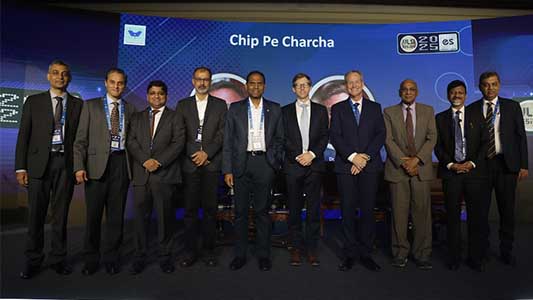Bangalore, India: The 38th edition of International Conference on VLSI Design & 24th International Conference on Embedded Systems organised by the VLSI Society of India (VSI) was officially inaugurated today, 6th January, 2025 at The Leela Palace, Bengaluru with a clutch of top Semiconductor leaders and Govt dignitaries.
The inaugural ceremony kick started on a high note highlighting the theme “Silicon Meets AI: Sustainable Innovations in Accelerated Computing, Secure Connectivity & Intelligent Mobility,” showcasing the critical role of VLSI and Embedded Systems in driving transformative advancements across AI/ML, 5G, IoT, quantum computing, and electric vehicles. Reaffirming its position as a premier global event the prestigious symposium boasted of bringing together 2700 plus registrants, 18 key notes, 32 Tutorials, 74 papers, 5 expert panels, 16 user design sessions, over 50 exhibits, 13 industry forum sessions, 15 design contest finalists and over 30 sponsors at VLSID 2025.
The ceremony was addressed by DR. CHRIS MILLER, Professor at Tufts University and Author, Chip War: The Fight for the World’s Most Critical Technology. ‘Chip-Pe-Charcha’ an engaging fireside chat session with Chris Miller, moderated by Dr. Satya Gupta, President, VSI was one of the key highlights of the inaugural ceremony. Key takeaways from the session:
- Global Innovations in Semiconductors: Insights into emerging technologies like Edge Computing, Data Centers and Compound Semiconductors.
- India’s Semiconductor Roadmap: Strategic discussions on positioning India as a global hub for semiconductor innovation.
- Groundbreaking Research: Over 22 cutting-edge topics explored, including Hardware for Machine Learning, VLSI for Automotive Systems, Quantum Computing, and Neuromorphic Computing.
- Inspiring Dialogues: Keynote speeches, workshops and panel discussions led by industry visionaries and technical experts.
Dr. Satya Gupta, President VLSI Society of India, said, “The VLSID 2025 conference is a remarkable convergence of global talent and innovation. It provides a unique opportunity to address the complex challenges of tomorrow while fostering collaboration across the semiconductor and AI ecosystems. The world is watching India making great tech strides in semiconductors. This conference puts another spotlight on India.”
Patrick Johnson, Senior Corporate Vice President, Microchip Technology and an executive chair of the VLSI Design Conference said: “The integration of Silicon and AI has unlocked unprecedented opportunities. VLSID 2025 is the ideal platform to explore how these advancements can redefine mobility, connectivity, and computing.”
Sandeep Bharathi, Chief Development Officer, Marvell Technology said: “With the emerging semiconductor ecosystem across Design and Manufacturing, AI and ML are going to be essential to speed up learning and integrating processes to strengthen the ecosystem. AI and ML are not just disrupting the semiconductor design ecosystem – they’re redefining its very fabric, empowering innovators to dream bigger and push the boundaries of what’s possible. We are glad that we could provide an ideal platform at VLSID 2025 to further explore how these advancements can redefine mobility, connectivity and give rise to a new generation of technological breakthroughs.”
Hitesh Garg, Vice President and India Managing Director, NXP Semiconductors said, “The semiconductor industry’s future growth and innovation rely heavily on a robust talent pipeline and a thriving startup ecosystem. Programs that facilitate industry-academia exchanges, provide students and young professionals with hands-on training and mentorship that can foster a culture of innovation and entrepreneurship, and stay competitive in the global market. VLSID 2025 provides an excellent cross learning opportunity among industry participants, startup ecosystem, and academia. It also enables students and researchers to present their ideas to industry veterans and address emerging challenges and capitalize on new opportunities.”
The event served as a critical platform for industry and academia, facilitating networking and knowledge sharing to address the challenges and opportunities of tomorrow. It also supported India’s flagship initiatives such as Digital India, Make in India and Startup India, laying the groundwork for a sustainable and innovative digital economy. The exhibition area too witnessed heavy footfall, bringing 58 best ESDM organizations under one roof.











